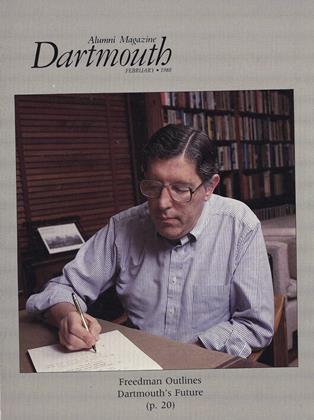Green and white blurred into one circular, sweeping motion as the attacker's leg cocked before the ball. With explosive force the ball shot past the goalie and into the net. The penalty shot was good, and the winning players shouted and embraced each other.
Another victory for Dartmouth soccerwomen's soccer. Since coeducation, women have been crucial to the success of the College's athletic program. Tradition has been one impetus: the deeply felt pride in wearing a green sweater with a white knitted "D." "We want to bring honor to the College," says Kate Perle '88, captain of the undefeated 1987 field hockey team.
There's another motive for success as well: the women have had something to prove. From the start, many members of the Dartmouth family worried that coeducation would dilute the College's sports, ruining its tough, winning spirit. When women first arrived, a place needed to be carved out for them in athletics. The lack of resources could have been discouraging, but the women rose above their limits. Almost immediately, female athletes became the envy of Dartmouth sports, as a few statistics amply reveal:
• Between 1977 and 1987, women's teams earned 12 Ivy League championship titlesincluding five titles in basketball, two in lacrosse, and two in rowing. This number equalled the men's record.
• Against all outside opponents, the Col- lege's 16 official women's teams rank second in the Ivy League behind Harvard, with a total won-lost record of .598. Dartmouth men, on the other hand, are ranked last in the league, with a .493 record.
• In competition against Ivy League opponents since the league began, the women's teams are ranked third behind Harvard and Princeton with a won-lost percentage of .578. The men's teams are again last, with a .410 record.
• Since 1979, eight female athletes have each received three or more All-Ivy honors in basketball, field hockey, ice hockey, lacrosse, or squash. Five male athletes have received the same honors in football, golf, and lacrosse—since 1957.
While the records differ, the spirit is the same for men and women. The wonderful feeling of being a part of the Dartmouth community comes at different times for different people, but for athletes the pride of wearing a green and white uniform is their own forever.
"This, I suggest, may be the uniqueness of Dartmouth's opportunity now," said President Dickey in 1961: "to demonstrate a revitalization of the historic college purpose in today's terms." Those words ring equally true today for Dartmouth athletics. In their own way, women have proved themselves vital to the renewal—and reinterpretation—of the traditional College spirit.
Senior Townley Slack, an English major, servedas manager of the Ivy champion lacrosse team.
 View Full Issue
View Full Issue
More From This Issue
-
 Cover Story
Cover StoryThe President Makes His Case
February 1988 By James O. Freedman -
 Feature
FeatureTHE HOPEFUL
February 1988 By Peter J. Dorsen '66 -
 Feature
FeatureThe Unmysterious Bible
February 1988 By Nardi Reeder Campion -
 Sports
SportsCelebrating Winter
February 1988 By Tom Corcoran '54 -
 Article
ArticleDartmouth Authors
February 1988 -
 Article
ArticleFour Alumni Authors from the '40s to the '80s
February 1988
Article
-
 Article
ArticleDean Laycock Tours
MARCH 1929 -
 Article
ArticleDartmouth in the High Hills
May 1940 -
 Article
ArticleCouncil Elections
April 1943 -
 Article
ArticleMaster of Intelligence
MAY | JUNE 2014 By Jake Tapper ’91 -
 Article
ArticleThayer School
June 1962 By RUSS STEARNS CE'38 -
 Article
ArticleThe Next Athletic Facility: An Indoor Imitation of a Cliff
Winter 1993 By Tyler Stableford '96

